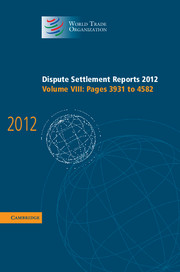Book contents
- Frontmatter
- Contents
- China — Measures Related to the Exportation of Various Raw Materials (WT/DS394, WT/DS395, WT/DS398)
- PHILIPPINES - TAXES ON DISTILLED SPIRITS
- PHILIPPINES - TAXES ON DISTILLED SPIRITS
- ANNEX G VARIOUS RELEVANT DOCUMENTS
- LIST OF ABBREVIATIONS USED IN THESE REPORTS
- I INTRODUCTION
- II FACTUAL ASPECTS
- III PARTIES' REQUESTS FOR FINDINGS AND RECOMMENDATIONS
- IV ARGUMENTS OF THE PARTIES
- V ARGUMENTS OF THE THIRD PARTIES
- VI INTERIM REVIEW
- VII FINDINGS
- VIII CONCLUSIONS AND RECOMMENDATIONS
- ANNEX A FIRST WRITTEN SUBMISSIONS OF THE PARTIES
- ANNEX B SUBMISSIONS OF THE THIRD PARTIES
- ANNEX C ORAL STATEMENTS OF THE PARTIES AT THE FIRST SUBSTANTIVE MEETING
- ANNEX D ORAL STATEMENTS OF THE THIRD PARTIES
- ANNEX E SECOND WRITTEN SUBMISSIONS OF THE PARTIES
- ANNEX F ORAL STATEMENTS OF THE PARTIES AT THE SECOND SUBSTANTIVE MEETING
- ANNEX G VARIOUS RELEVANT DOCUMENTS
- Cumulative List of Published Disputes
III - PARTIES' REQUESTS FOR FINDINGS AND RECOMMENDATIONS
from PHILIPPINES - TAXES ON DISTILLED SPIRITS
Published online by Cambridge University Press: 13 December 2017
- Frontmatter
- Contents
- China — Measures Related to the Exportation of Various Raw Materials (WT/DS394, WT/DS395, WT/DS398)
- PHILIPPINES - TAXES ON DISTILLED SPIRITS
- PHILIPPINES - TAXES ON DISTILLED SPIRITS
- ANNEX G VARIOUS RELEVANT DOCUMENTS
- LIST OF ABBREVIATIONS USED IN THESE REPORTS
- I INTRODUCTION
- II FACTUAL ASPECTS
- III PARTIES' REQUESTS FOR FINDINGS AND RECOMMENDATIONS
- IV ARGUMENTS OF THE PARTIES
- V ARGUMENTS OF THE THIRD PARTIES
- VI INTERIM REVIEW
- VII FINDINGS
- VIII CONCLUSIONS AND RECOMMENDATIONS
- ANNEX A FIRST WRITTEN SUBMISSIONS OF THE PARTIES
- ANNEX B SUBMISSIONS OF THE THIRD PARTIES
- ANNEX C ORAL STATEMENTS OF THE PARTIES AT THE FIRST SUBSTANTIVE MEETING
- ANNEX D ORAL STATEMENTS OF THE THIRD PARTIES
- ANNEX E SECOND WRITTEN SUBMISSIONS OF THE PARTIES
- ANNEX F ORAL STATEMENTS OF THE PARTIES AT THE SECOND SUBSTANTIVE MEETING
- ANNEX G VARIOUS RELEVANT DOCUMENTS
- Cumulative List of Published Disputes
Summary
3.1 The provisions of the WTO covered agreements raised by the complainants are Article III: 1 and Article III:2, first and second sentences, of GATT 1994. The complainants have made the following claims:
(a) That the excise tax imposed by the Philippines constitutes an internal tax applied to imported distilled spirits “in excess” of those applied, directly or indirectly, to “like” domestic products and is, therefore, inconsistent with the first sentence of Article III:2 of GATT 1994; and,
(b) That the Philippines does not apply the excise tax to imported distilled spirits and “directly competitive or substitutable” domestic distilled spirits “similarly”, and such tax is applied “so as to afford protection to domestic production”. This tax is, therefore, inconsistent with the second sentence of Article III:2 of GATT 1994.
3.2 The Philippines argues that the claims under Articles III:1 and III:2 should be rejected because the imported and domestic products at issue are neither like nor directly competitive or substitutable. With respect to the claim based on the second sentence of Article III:2, the Philippines argues further that, even if the products at issue were directly competitive or substitutable, the claim should nevertheless be rejected because: (1) domestic and imported products are in fact similarly taxed; and, (2) even if they are not similarly taxed, the excise tax at issue is not being applied so as to afford protection to domestic production.
- Type
- Chapter
- Information
- Dispute Settlement Reports 2012 , pp. 4328 - 4329Publisher: Cambridge University PressPrint publication year: 2014



